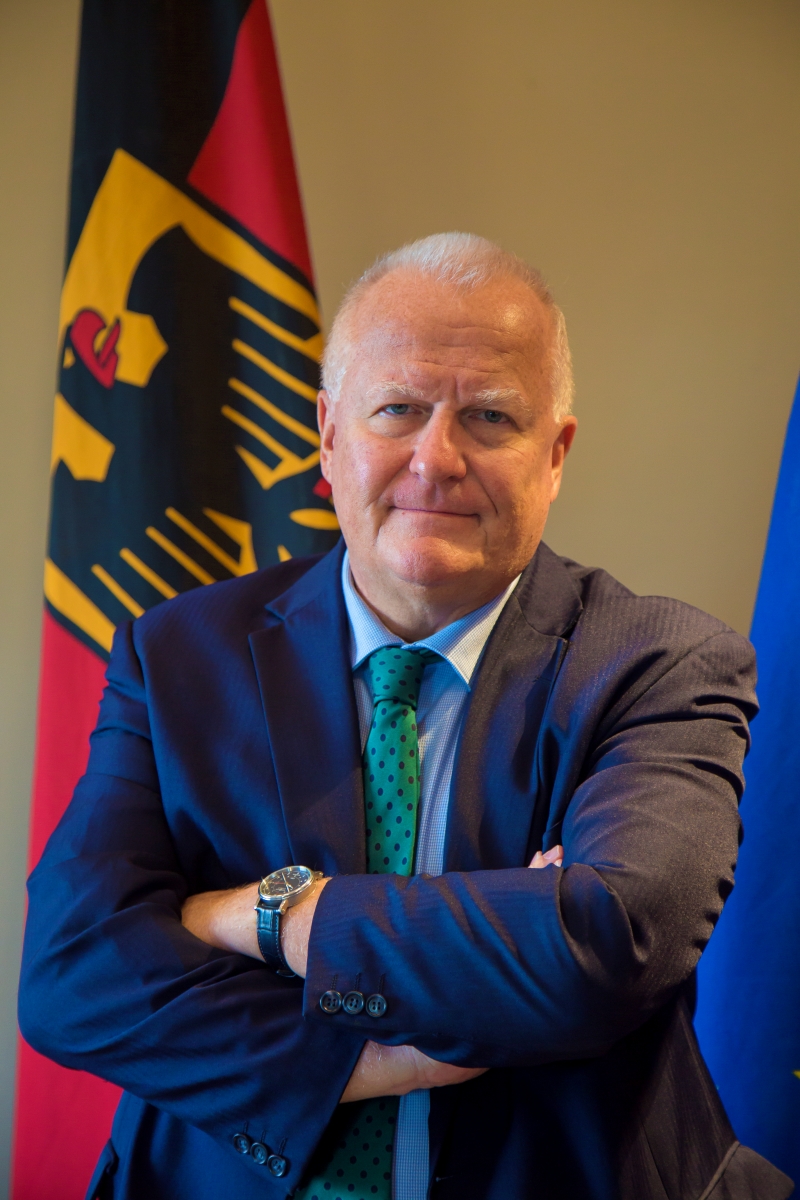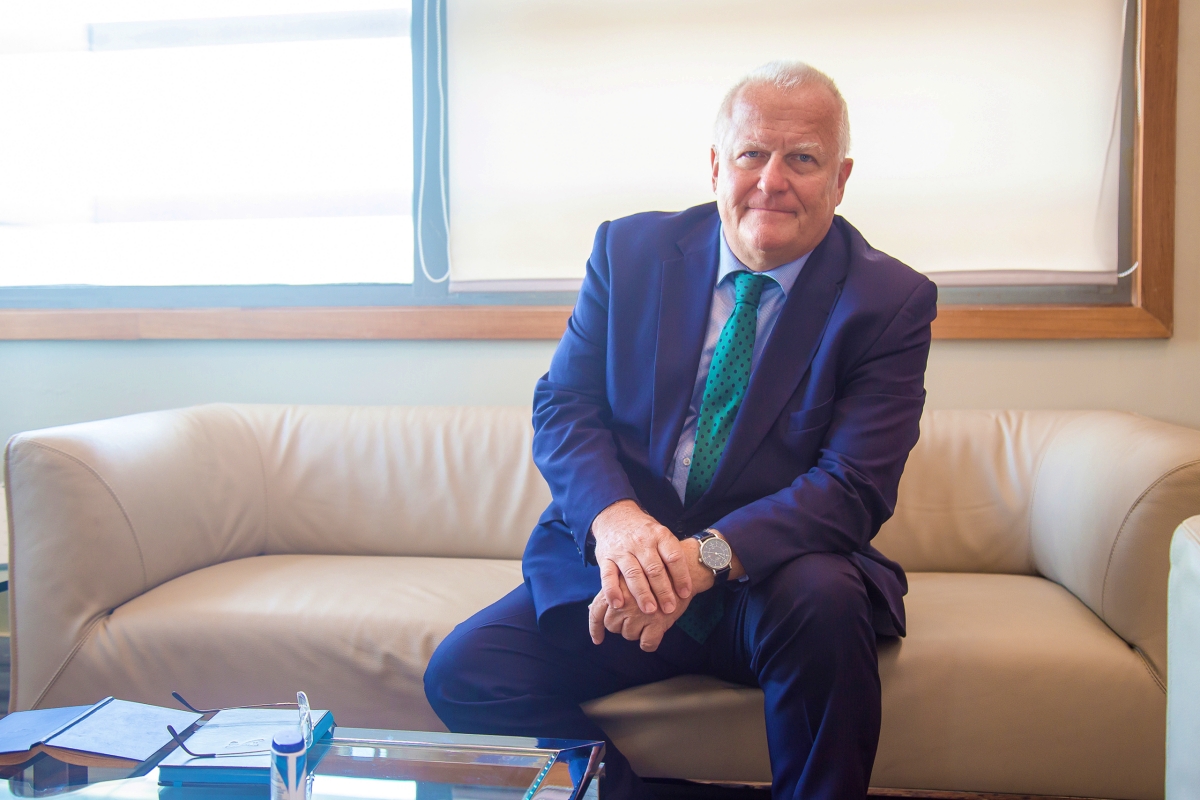From Germany with Love
In a candid interview, Peter Fahrenholtz, the German Ambassador in Dhaka talks about his love for Bangladesh and its culinary delights in addition to sharing his excitement with Advisory Editor of Colors Ziaul Karim about Bangladesh’s economic miracle.
A set of beige-colored sofas; a painting on the Rohingya plight by Raunak Afroz, a student of Queen’s School and College; a Persian calligraphy painting in shimmering hues; a simple functional desk in a room at least 50 square meters long… we are in Peter Fahrenholtz’s office in the Franco-German embassy in Dhaka’s Baridhara diplomatic enclave. Minimalist in design, the room seems to epitomize the mantra of the celebrated German architect Ludwig Mies van der Rohe, “less is more!”
The chancery, a unique blend of modern and Moghul traditions, was designed by the French architect, Stephane Paumier. Interestingly, the architect himself was born in 1971, the year of our independence.

Photo: Kazi Mukul
Ambassador Fahrenholtz declares: ‘the building itself testifies to Germany’s commitment to Bangladesh. We have invested so much for this chancery. We believe we need to be here to move forward together with our friends in Bangladesh’.
In response to my question as to what made him a diplomat, he talks about his conviction that peaceful resolutions to any conflict can be arrived at through dialogue where a diplomat can be a catalyst. The spirit of the new Germany, he stresses, is to be an agent of development and change for the better for countries like Bangladesh. He elaborates on the issue thus: ‘Germany has had a difficult history – World War I, World War II, Nazis, the Holocaust, — all these left indelible scars on its collective memory. In the Federal Republic of Germany, we have had this conviction after 1949 that we need to do better. We need to make a positive contribution towards building a better world. As a diplomat, this is something that I wanted to be part of.’ He goes on to say, ‘We Germans are a trading nation. We are not soldiers and we envision a peaceful multilateral world, which will benefit everyone.’
Praising the inherent resilience of the people and the great progress Bangladesh has made in recent times, the German diplomat stresses what Bangladesh has had to go through in the past, and the sacrifices the people of the country had to make. He notes, ‘The start was not too great for Bangladesh, for the country was very poor when it began life as an independent nation.’
Today Bangladesh is the fastest growing country in the region. A student of economics, Fahrenholtz declares unequivocally his view that economic growth should not widen inequalities in society. Though impressed by the phenomenal growth of the Bangladeshi economy, he has a cautionary note: ‘Economic growth should not happen for the benefit of the elites or for the benefit of companies; rather, growth should be holistic and should benefit the whole nation.’
Appreciating Bangladesh’s current lower-middle-income country status, he suggests that in order to move from strength to strength, governance issues must be addressed. Most importantly, corruption needs to be curbed. ‘Improvement in the rule of law is the need of the hour,’ he points out, calling democracy as the most stable system operating in the world at present. He is confident that Bangladesh leaders appreciate the importance of democracy sufficiently and are aware that improvements have to be made in the years to come.
Germany is the second-largest export destination of Bangladesh after the United States and the volume of bilateral trade between the countries is on the rise. Bangladesh has exported goods worth over 5 billion Euros to Germany against imports amounting to less than a billion Euros from it. Of Bangladesh’s total exports, over 90 percent are textile products. Aware that Bangladesh is one of the few nations in the world with which Germany has a trade deficit, the diplomat sees scope aplenty for diversification of trade between the two countries for mutual benefits.
What the diplomat likes to see is greater investment by German and European companies in Bangladesh. He perceives investment potentials in the automobiles sector, particularly now that the economy is growing fast and a strong middle-class is beginning to assert itself. He wonders out loud, ‘Why should the middle class continue to use second-hand cars? Shouldn’t they be using brand new cars produced in Bangladesh?’
He mentions that German companies have factories in South Africa and Pakistan. Bangladesh, he suggests, can also take advantage of Germany’s expertise and collaborate in the areas of machinery, chemicals, pharmaceuticals, ICT, and infrastructure. He credits Bangladesh’s focus on the development of the railway sector as a ‘wise choice’.
‘Bangladesh is a country with high population density and 106 million working-age population. With such a demographic dividend, Bangladesh has plenty of opportunities to become a developed country by 2041. The bottleneck to greater and faster foreign investment is ‘red tape which needs to be cut down.’ He says regretfully that foreign companies need approval from about 42 agencies to invest in Bangladesh. ‘This situation needs to be improved fast. Otherwise, this factor will pose a barrier to Bangladesh’s aspirations of becoming a developed country,’ he adds.
Currently, there are 60 German companies
Since Germany is the second-largest importer of garments from Bangladesh, the German development agency GIZ is ‘heavily engaged in cooperating with Bangladesh’s garments sector.’ The diplomat is glad to see Rubana Huq at the helm of the Bangladesh Garments Manufacturers and Exporters Association (BGMEA) as she has ‘the vision for and knowledge of the garments sector.’
Dwelling on the future of the apparel sector, Fahrenholtz notes that conditions in the European market are changing fast and that the Bangladesh garments sector needs to adapt and adjust to the changes. He underscores in this context the importance of “the Green Buttons”, certifying that garments are produced in ecologically and socially sustainable conditions, thereby fulfilling certain benchmarks. He further refers to the current thinking in Germany emphasizing a supply chain law which can make it obligatory for every importer importing from developing countries to comply with guidelines requiring that every product is produced in an ecologically and socially sustainable way. He observes, ‘Conditions and laws are changing and so it’s better to adjust early and proactively. My advice is don’t be surprised; do market research in Germany, and prepare for changes in the demand profile.’
He has no confusion about what Bangladesh’s priorities are or should be and goes on to say, ‘If you give Bangladeshi businessmen the right opportunities they will do well in business.’ He notes that though in some cases, Bangladesh is a latecomer ‘that’s not bad at all since when you start late, you can learn from other’s mistakes. ASEAN could be an example for you.’

In the cultural arena, Bangladesh and Germany have long been cooperating with each other. German Nobel Prize winner Günter Grass paid a visit to Bangladesh way back in 1986. He also points out that that Goethe-Institute, the cultural institute of Germany, has been operating in Bangladesh for many decades now, fostering cultural cooperation, arranging a wide range of cultural events presenting German culture, and offering German language courses. For enhancing intercultural exchange and to support the learning of German language, there is an office of German Academic Exchange Service (DAAD) for students, researchers, academics and scholars.
For the capacity enhancement of Bangladeshi filmmakers, Germany has earmarked the area of film production. The ambassador stresses that ‘Germany would like to assist local filmmakers on the production side,’ adding that, a workshop in this regard was held in Dhaka in February this year.
Ambassador Fahrenholtz is a gourmet. Narrating his memory of a recent trip to the northern district of Gaibandha at the invitation of a friend, he says he was amazed by the ‘most delicious Bangladeshi food items I have ever eaten.’ He hopes he will get many more invitations to try more Bangladeshi dishes.
When the interview was over my colleague requested the ambassador for a photo session to which he readily agreed, but rejected the idea of giving a smile for the camera saying that would be a ‘false smile.’ Throughout the photo session, there was hardly any dent to his seriousness.
As we were taking our leave, he showed us a blue cloth-bounded 1962 Macmillan edition of Gitanjali. A hint of a smile now flashed on his face while he was showing his prized possession. He is not just excited about Bangladesh’s economic growth, but also perhaps trying to comprehend the messages of love through his readings of Rabindranath Tagore.
Well, possibly now we know what it means to have a sincere and genuine smile.




